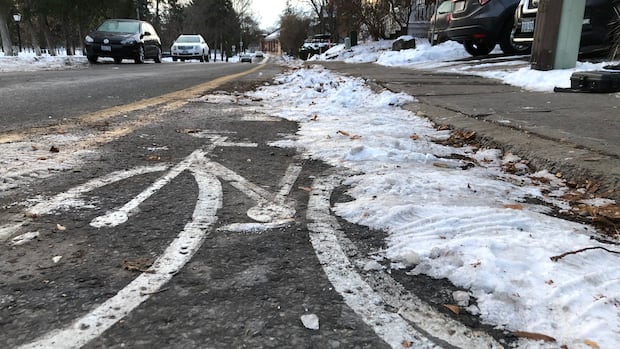OttawaNew provincial legislation prohibiting how municipalities can build bike lanes means three projects in Ottawa likely can’t move forward and others will get more expensive, according to a city report.City staff believe 2 downtown projects, 1 in Orléans cannot move forwardNathan Fung · CBC News · Posted: Nov 27, 2025 8:57 AM EST | Last Updated: 2 hours agoListen to this articleEstimated 4 minutesThe audio version of this article is generated by text-to-speech, a technology based on artificial intelligence.Construction to extend the O’Connor Street bike lane north was supposed to begin in the spring, but will likely not be able to go ahead due to new provincial laws. (Hallie Cotnam/CBC)New provincial legislation prohibiting how municipalities can build bike lanes means three projects in Ottawa likely can’t move forward and others will get more expensive, according to a city report.The report to the city’s public works and infrastructure committee Thursday goes over some of the high-level effects of Bill 60, an omnibus bill that passed third reading Monday. Part of that legislation prohibits municipalities from reducing the number of lanes available for motor vehicles to add bicycle lanes or “any other prescribed purpose” if they haven’t already signed a construction contract.Two such projects are in downtown Ottawa: extending the bike lane on O’Connor Street north to Wellington Street and changes to Albert and Slater streets when existing bus lanes are decommissioned. About $1.7 million has already been spent on them, city staff said.”We are doing the multi-million dollar work to go in to dig up that street to completely redo [Albert and Slater] and we can’t update it to modern standards because the province is stopping us from doing it,” said Somerset Coun. Ariel Troster.Another project that may have been killed is redesign work on St. Joseph Boulevard between Jeanne d’Arc and Belcourt boulevards in Orléans.Staff said other projects will need to be redesigned and possibly expanded and they don’t know how much it will cost, nor how much more time that will take. Projects could be moved up or down the priority list accordingly.They also said they will be examining the new law in depth to make sure their interpretations are correct — what the bill means for lanes that allow both parking and driving, for example.Many cycling projects are able to go forward. The report said more than 70 projects in the Transportation Master Plan comply with the new laws as they don’t involve removing lanes of vehicle traffic.The report points out that cycling has been seeing “rapid growth” in Ottawa in the last 15 years, with nearly 10 per cent of people in and around the core and four per cent overall making daily trips on their bikes.’It’s going to be a complete waste’Florence Lehmann, a board member with Bike Ottawa who protested against the bill earlier in November, called the bill “extremely regressive,” and worries it will push people away from cycling and other forms of active transportation.”I’m a second-class citizen from a transportation perspective. Basically what the province is saying is if you’re not in a car you don’t matter,” Lehmann said.WATCH | Ottawa cyclists, advocates protest bike lane changes in controversial bill:Ottawa cyclists, advocates protest bike lane changes in controversial billProtesters gathered outside city hall in opposition to the provincial government’s Bill 60, which prohibits municipalities from reducing traffic lanes to add bicycle lanes or for “any other prescribed purpose.”Marko Miljusevic of Strong Towns Ottawa, an urbanism advocacy group, said the province is encroaching on municipal decision-making.”Cities know best kind of what they need. Transportation is best done at the local level. So to us, it doesn’t really make sense to take that out of the city’s toolbox. Every city is different. Every neighborhood in the city is different,” he said.City staff are recommending funding for projects unable to go forward should be redirected to other transportation projects geared toward pedestrians and vulnerable road users. That recommendation is welcomed by both Troster and Lehmann. Troster also said she wants to find a way to preserve those planned projects if the legislation changes or is challenged in court.”A lot of these projects have been in the books for years and we’ve been waiting to fund them or … for the right opportunity to take advantage of other public works that needed to be done,” she said.”Now it’s going to be a complete waste.”ABOUT THE AUTHORNathan Fung is a reporter with CBC Ottawa, with a strong interest in covering municipal issues. He has previously worked as a reporter in Hamilton and Edmonton. You can reach him at nathan.fung@cbc.ca
Wednesday, 4 Mar 2026
Canada – The Illusion
Search
Have an existing account?
Sign In
© 2022 Foxiz News Network. Ruby Design Company. All Rights Reserved.
You May also Like
- More News:
- history
- Standing Bear Network
- John Gonzalez
- ᐊᔭᐦᑊ ayahp — It happened
- Creation
- Beneath the Water
- Olympic gold medal
- Jim Thorpe
- type O blood
- the bringer of life
- Raven
- Wás’agi
- NoiseCat
- 'Sugarcane'
- The rivers still sing
- ᑲᓂᐸᐏᐟ ᒪᐢᑿ
- ᐅᑳᐤ okâw — We remember
- ᐊᓂᓈᐯᐃᐧᐣ aninâpêwin — Truth
- This is what it means to be human.
- Nokoma











